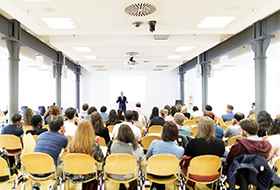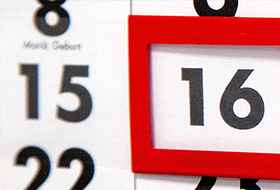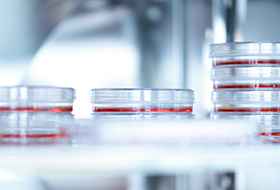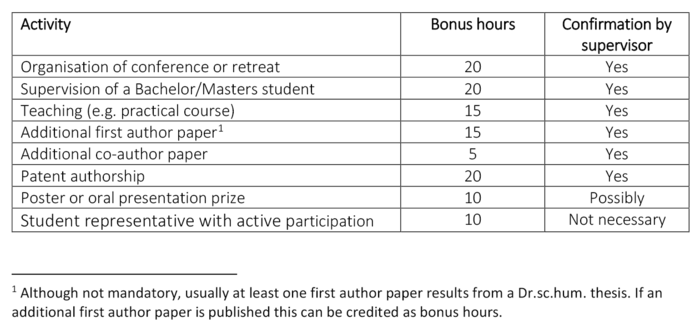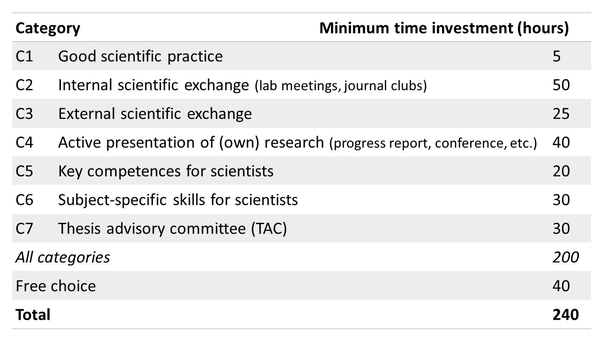You are here
Content
General
The structured doctoral program for the Dr. sc. hum. includes a number of areas (categories) that are important for scientific training and should generally comprise 240 hours.
More detailed information regarding the categories can be found below and downloaded here.
The STMM offers Introductory Days, annual Industry and Innovation Days and a Summer Symposium, which already cover a number of the teaching requirements for the STMM structured programme. For certain content, it may be helpful to participate in courses and activities that are not offered by the STMM, but which are thematically relevant for the doctoral student's education and training. Assuming the contents of these courses or activities meet the requirements of a particular category in the curriculum, they can in principle also be recognized for the STMM structured training program for the Dr. sc. hum. degree, subject to confirmation by the STMM office and the doctoral student’s supervisor.
The booking of STMM courses and events and the recognition of other activities takes place via the STMM IT platform LEARN.
Curriculum
As a rule, 240 hours should be achieved within the structured program for the Dr. sc. hum. The curriculum of the STMM training program consists of seven categories. A certain minimum number of hours must be achieved in each category, which adds up to a total of 200 hours. The freely selectable 40 hours can come from any category and/or be filled with bonus hours.
Category 1. Good scientific practice (C1)
Training in the principles of good scientific practice covering all aspects of the research process is required in this category. This includes good scientific conduct for researchers and supervisors during the research process, project design (including controls, statistics and randomization), data management and ownership, documentation and archiving, ethical issues in human and animal research as well as data protection, publishing and reviewing ethics, current guidelines (e.g. DFG and university regulations) as well as procedures for non-compliance with good scientific practice.
Category C1: Minimum 5 hours
Details: Participation in the GSP content of the STMM Introductory Days is mandatory. If equivalent courses have been completed recently, these may be recognized under certain circumstances.
Proof: Participation in the STMM Introductory Days; Other evidence must be uploaded to the STMM platform LEARN and confirmed by the STMM office.
Category 2. Participation in internal scientific exchange (C2)
Participation in internal scientific exchange involves the discussion of research and literature in the student’s own research environment, through regularly participating in lab meetings, progress reports and journal club presentations throughout the whole course of the doctorate.
Category C2: Minimum 50 hours
Details:
During the course of the doctorate regular participation in:
- Lab or progress meetings in your own working group
- Literature seminars (journal clubs), within or outside your own working group.
Each individual participation is recognized with 1 h
Proof: The completed form or a list of participations is uploaded regularly (e.g., annually) to the STMM platform LEARN. Confirmation by the supervisor is required, either electronically or by signing the form.
Category 3. Participation in external scientific exchange (C3)
External scientific exchange involves joining presentations about research from outside the student’s own research group, such as attending talks given by invited speakers, as well as UMM Grand Rounds, lecture series offered by institutes and clinics, Tag der Wissenschaft etc.
Category C3: Minimum 25 hours, at least 1 conference participation
Details:
During the course of the doctorate:
- Regular participation in research lectures (at least 6 per year), each individual participation is recognized with 1 h
- Participation in at least one conference during the doctorate, will be recognized with 5 h per full day
Proof: Evidence and/or the completed form must be uploaded to the STMM platform LEARN. Confirmation by the supervisor is required, either electronically or by signing the form. The conference visit can also take place as part of the STMM Summer Symposium.
Category 4. Active presentation of (own) research (C4)
During the course of the Dr. sc. hum. each student is required to give presentations internally and externally, including progress reports, journal club presentations and the presentation of research results at scientific meetings.
Category C4: Minimum 40 hours
Details:
During the course of the doctorate:
- At least one progress report in the own working group per year, will be recognized with 5 h workload
- At least one own presentation in a literature seminar (journal club) per year, will be recognized with 5 h workload
- At least one presentation (poster or oral) at a conference during the doctoral period, will be recognized with 10 h workload; this presentation can also take place as part of the STMM Summer Symposium or another symposium at the UMM
Proof: Evidence and/or the completed form must be uploaded to the STMM platform LEARN. Confirmation by the supervisor is required, either electronically or by signing the form.
Category 5. Key competences for scientists (C5)
Key competences for scientists include contents such as literature research and critical analysis of scientific literature, scientific writing of papers and grants, a basic knowledge of the design of animal experimentation and ethical permission applications, knowledge of project planning and data management. Some of these topics are best covered in combination with aspects from good scientific practice (C1). Additional components include patents and intellectual property issues, as well as soft skills such as communication skills, time and conflict management, career planning etc.
Category C5: Minimum 20 hours
Details: Within the STMM events (Introductory Days, Industry and Innovation Days and Summer Symposium) there is some C5 content. Many courses are offered by the Graduate Academy.
Proof: Participation in STMM events; other evidence must be uploaded to the STMM platform LEARN and confirmed by the STMM office.
Category 6. Subject-specific skills for scientists (C6)
In this category, training in subject-specific skills needs to be undertaken, in particular specialized methodologies that are of relevance for the student’s own research. Examples include methods for data analysis, statistics and bioinformatics, imaging (EEG, MRI, microscopy etc.) and image analysis, image processing and image quantification, wet-lab methods (FACS, sequencing methods etc.), animal work (e.g. FELASA course), and training in clinical studies, psychophysiology and innovation and entrepreneurship.
In addition to courses and workshops, lab exchanges to learn a new method can also be accredited in this category.
Category C6: Minimum 30 hours
Details: Content that is relevant to the own doctoral topic or can be found in the subject area of innovation and translation.
Proof: Evidence and/or the completed form must be uploaded to the STMM platform LEARN. Confirmation by the supervisor is required, either electronically or by signing the form.
Category 7. TAC meetings (C7)
At least three thesis advisory committee (TAC) meetings including a written report, presentation and discussion of the project are mandatory for each Dr. sc. hum. student and supervisor(s). The regulations governing TAC meetings and the associated documentation can be found on the STMM web pages.
Category C7: 10 hours per TAC, 30 hours total
Details: At least three TAC meetings during the course of the doctorate, each of which is credited with 10 h of work.
Proof: The written report on the doctoral project and the TAC report must be uploaded to the STMM platform LEARN.
Bonus hours
A total of 240 hours must be completed within the structured program. As the minimum hours for categories C1 to C7 only add up to 200 hours, an additional 40 hours of study need to be completed. These 40 hours can be freely chosen from any category. In addition or alternatively, they may be filled by bonus hours (please see below).
Recognition: The activities must take place during the course of the doctorate; Publications must have resulted from research that took place during the course of the doctorate.
Proof: Evidence must be uploaded to the STMM platform LEARN. Confirmation by the supervisor may be required, either electronically or by signing the form.
All events, lectures and internal laboratory activities that were not booked via the STMM IT platform LEARN must be entered in LEARN. Depending on the category, additional proof must be uploaded. If confirmation by the doctoral supervisor is required, he or she can confirm the activity electronically in LEARN or, alternatively, the signed recognition form can be uploaded.
Context Column

School of Translational Medicine (STMM)
Medical Faculty Mannheim,
Heidelberg University
Tridomus C, Ebene 3
Ludolf-Krehl-Straße 13-17
68167 Mannheim
The STMM office is closed
from 18.-29.8.2025.
Contact
STMM office
stmm@medma.uni-heidelberg.de
Dr. Susanne Hausselt
Management
Dr. sc. hum. programme
Phone +49 621 383-71597
Dr. Claudine Öngen
Dr. med. programme
Telefon 0621 383-71608
Ramona Ludwig
Administration + LEARN
Phone +49 621 383-71609
Mailing list for Dr.sc.hum. students
Dr.sc.hum. mailing list

